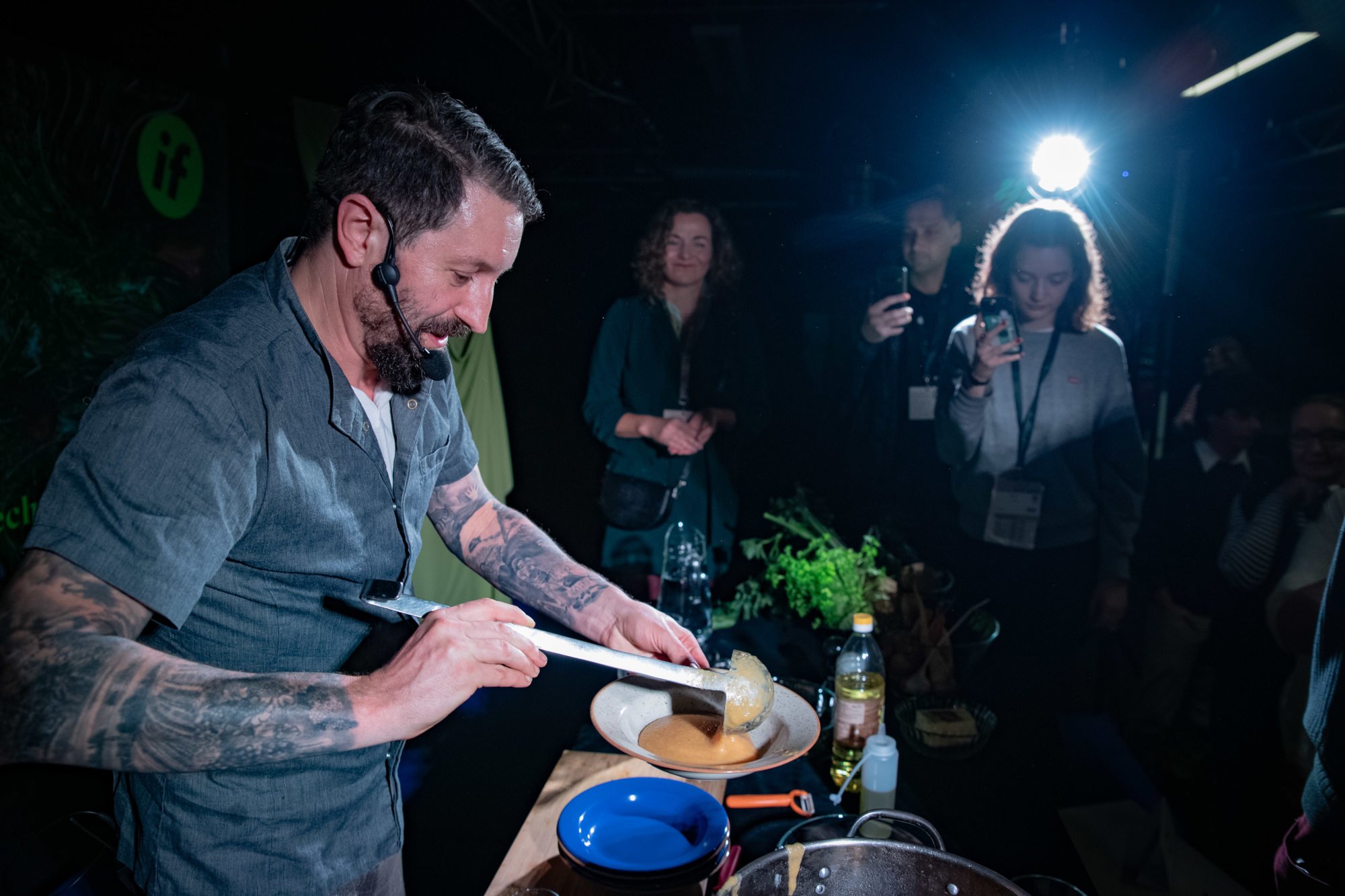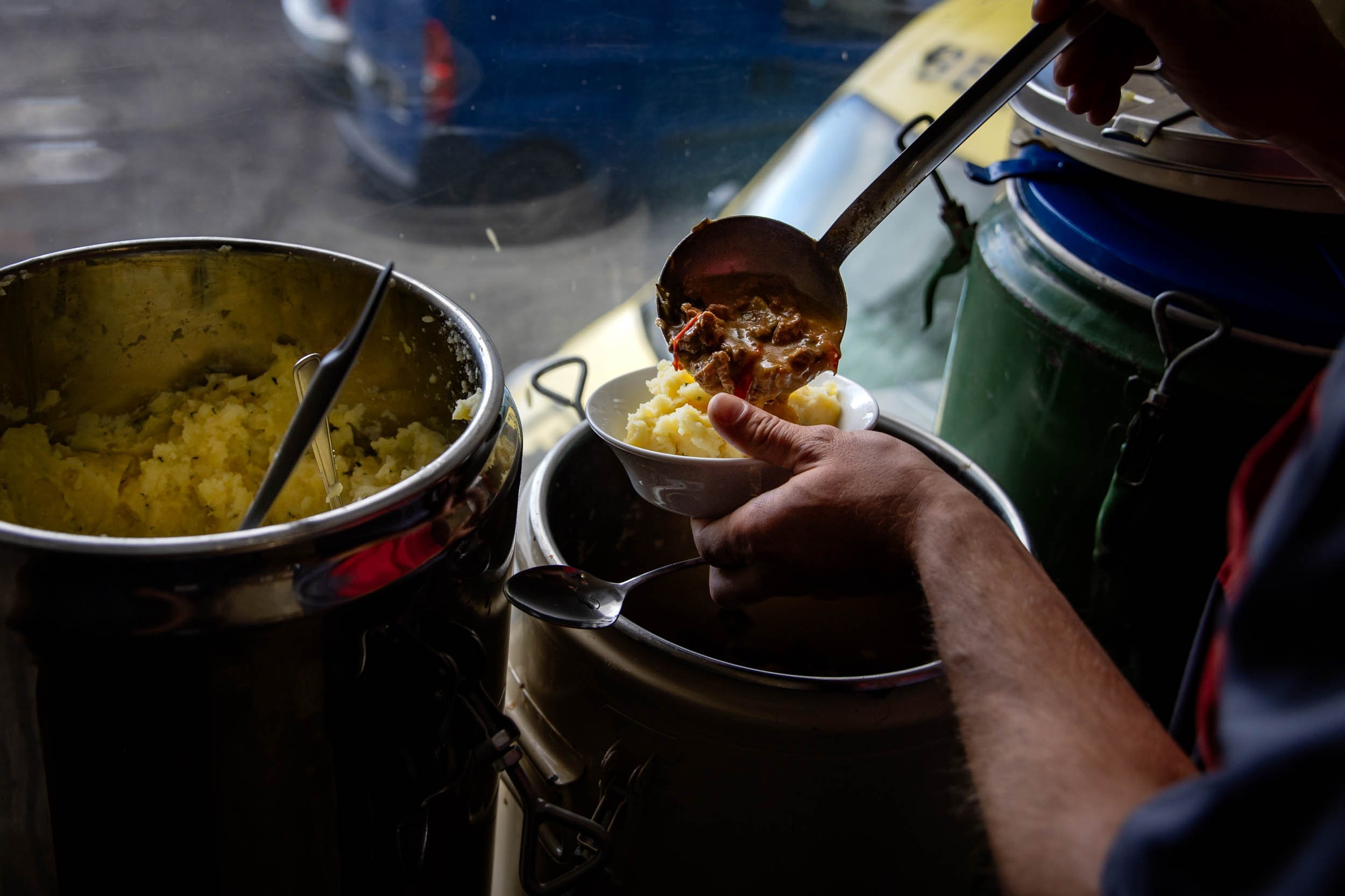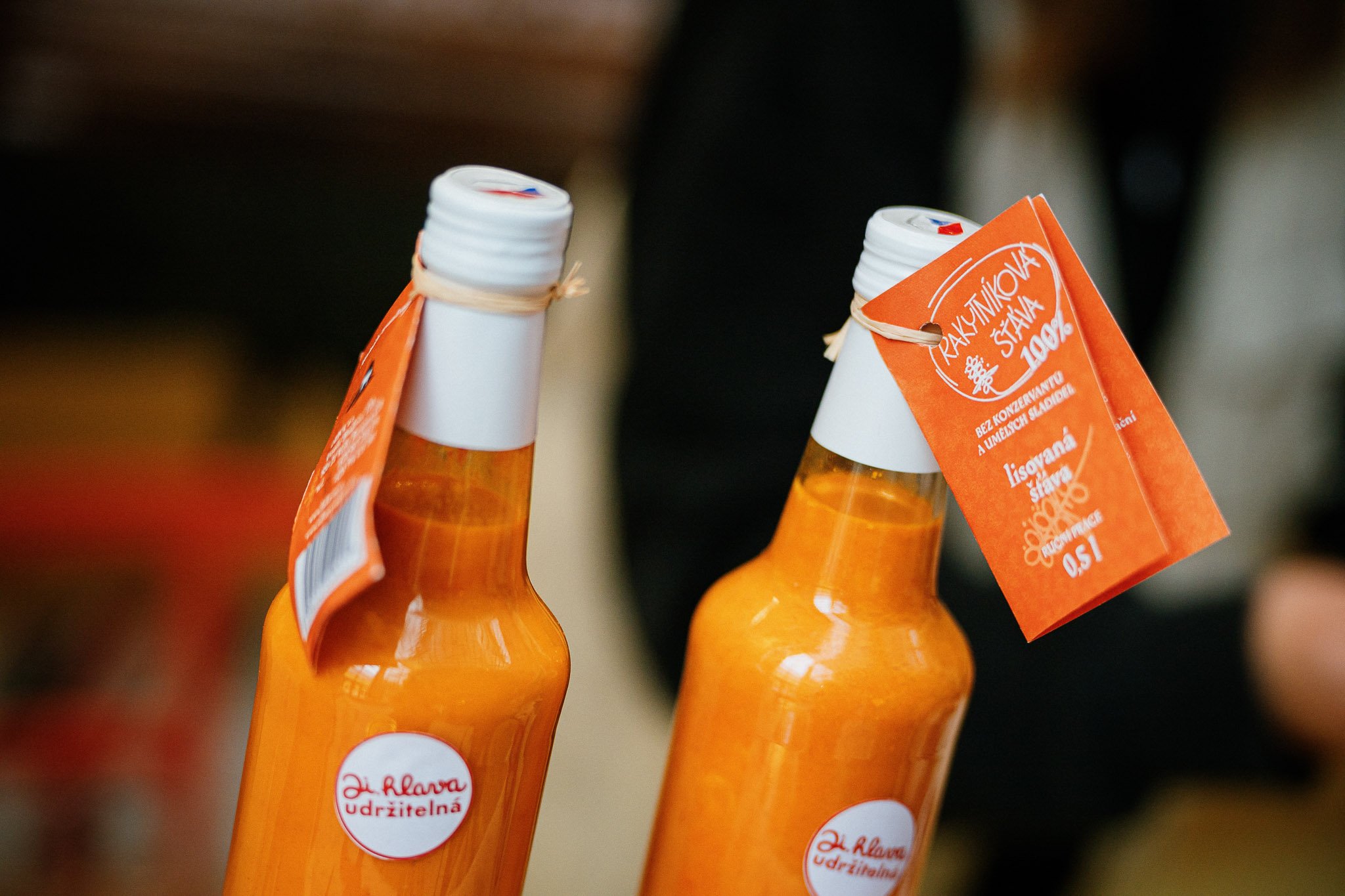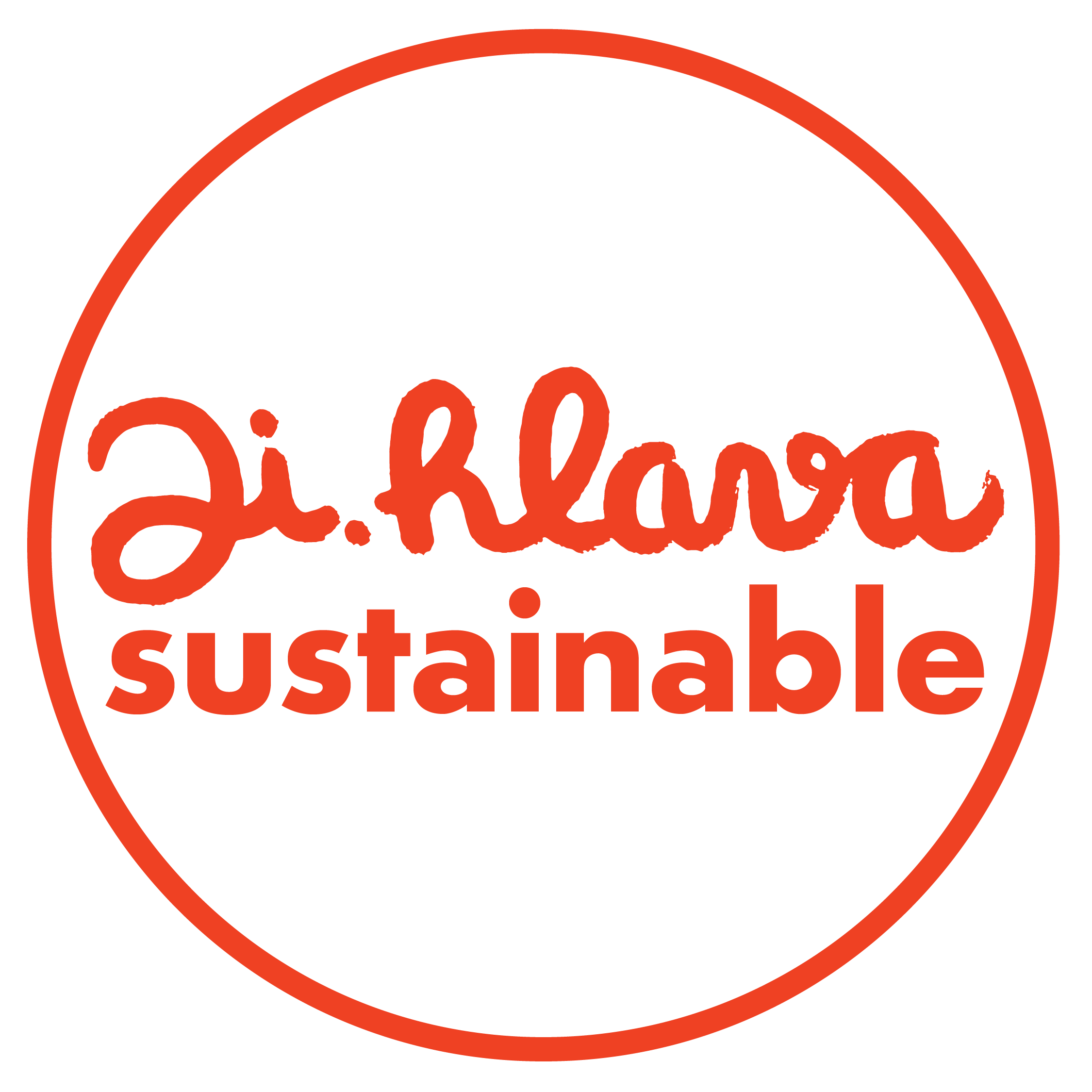Foreword of the Festival Founder
We have always dedicated attention to environmental themes in the programme of the Ji.hlava IDFF and have considered the festival's impact on the environment for a long time. However, when we decided to commit to a thoughtful environmental strategy, a whole range of new topics and questions emerged. Therefore, we introduced the position of an independent environmental ombudsperson, whom anyone can contact with questions or suggestions and who is a key partner in finding suitable solutions for the festival's organisation. Through mutual dialogue, we define new goals and specific procedures each year, as well as the topics we want to communicate publicly. In recent years, we have focused on more sustainable production, changing the transportation methods for visitors and guests, the number and quantity of printed materials, waste management, and festival catering. We have also compiled this report to share our experience with others. We believe that in this way, we can contribute to change not only in the organisation of cultural events.
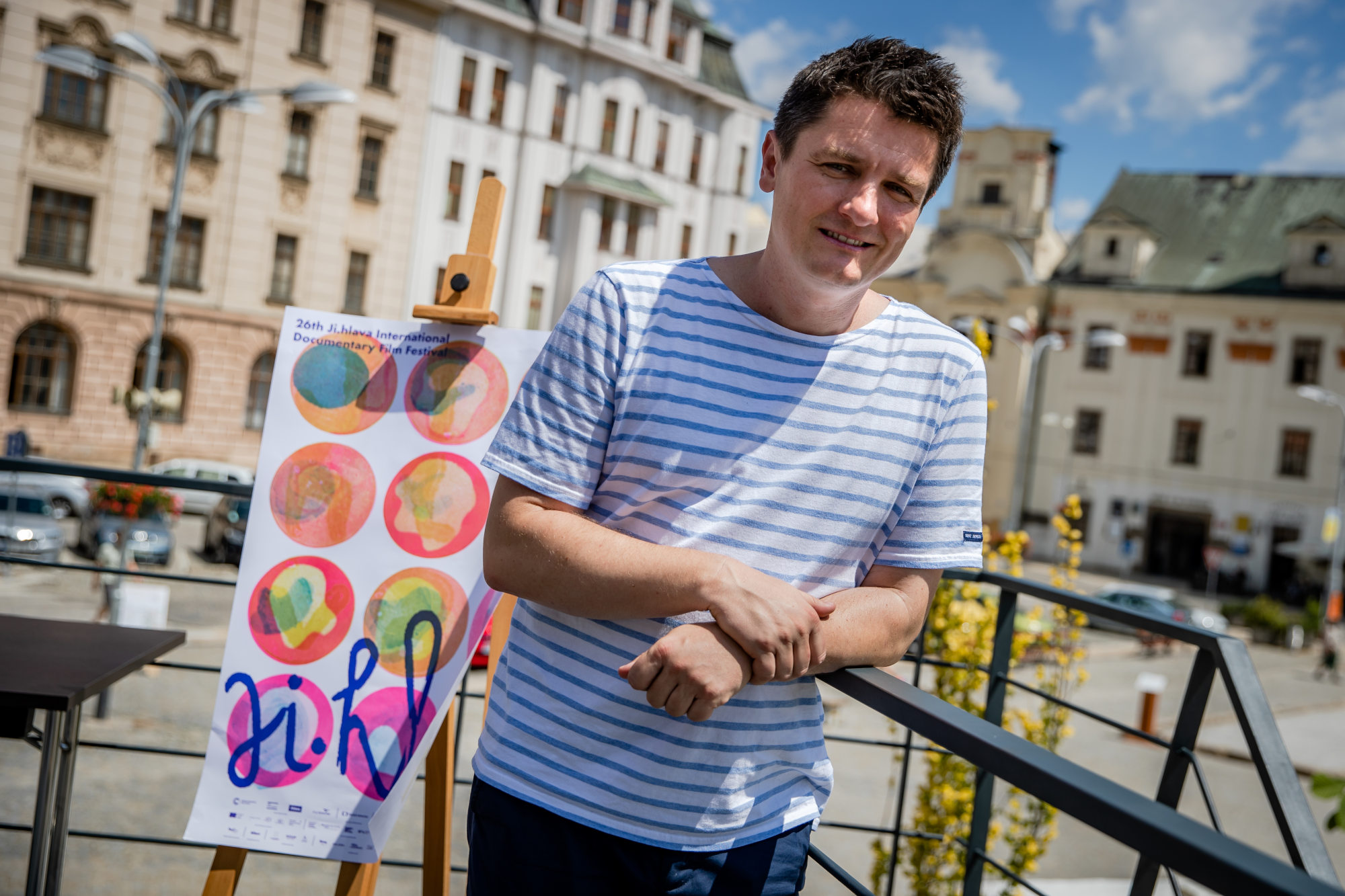
Marek Hovorka, Festival Director and Founder. Source Radek Lavička
Foreword on Behalf of the Environmental Ombudsperson’s Team
For the fifth year, the Ji.hlava festival team has taken an active stance on addressing the issues of climate collapse. More than ever, we recognize the crucial importance of sustainability, and our commitment is to actively transform global challenges into concrete local actions. Many changes in the festival's production, which annually attracts up to 6000 participants, require prioritization, extensive collaboration with local stakeholders, and most importantly, a willingness to learn from mistakes and continuously push our visions and goals forward, learning from errors and failures. This is why we decided to compile a final report that reveals successes and failures, and can help share our know-how with those who organize other cultural and crossover events and are beginning to address sustainability. We consider collaboration and sharing to be key elements of the change we wish to see around us.
In the organization and production of the festival, sustainability represents a long-term and continuously evolving agenda. From experience, we perceive the principle of continuous improvement and reflection as the most important. Significant changes are particularly evident when compared to the state before the implementation of individual sustainability measures. In this report, you can take a look behind the scenes at the specific steps we proactively seek and implement to achieve environmentally sustainable solutions in production, partnerships, and for the festival participants.
Soňa Klepek Jonášová
Ji.hlava’s Environmental Ombdusperson

Soňa Klepek Jonášová, Ji.hlava’s Environmental Ombdusperson. Source Insien
Call for collaborations
Who Can Benefit from the Ji.hlava Final Sustainability Report?
Our goal is to create an open platform for sharing best practices that will help all of us avoid the same mistakes and move more efficiently towards our common goal. The report captures the continuity of our activities and presents them in an understandable format to other readers. How do we think about sustainability? What are the experiences from past years, and how can we improve?
The final report can be useful for:
- Organizers of festivals and cultural or other events
- Event managers
- Event producers
- Community managers
- Sustainable agenda partnerships
- Guests and performers of festivals, cultural, and other events
- Visitors of festivals, cultural, and other events
- Journalists and influencers who want to support the idea of sustainability
- Anyone who wants to support sustainable production of events of various types and sizes
Sustainability Team
Soňa Klepek Jonášová – Eco-ombudsman, eko@ji-hlava.cz
Vanda Adlerová – Sustainability Strategy, Platform Building, and PR
Gabriela Bajerová Zezulová – Sustainability Strategy (2023 - 2024)
Anna Zelená – Sustainability Strategy and Production
Tereza Swadoschová – Sustainability Strategy and Platform Building
Martina Pospíšilová – Sustainability Strategy and Partnerships
Marek Hovorka – Sustainability Strategy and Platform Building
Our focus areas:
Six key long-term areas for sustainability:
- Food
- Waste
- Energy
- Mobility
- Collaboration
- Merchandise
Small Steps to a Big Change!
Since 2019, we have been implementing sustainability changes in the festival that have positively impacted not only the festival visitors but also Jihlava’s partners and local stakeholders. The themes we have been focusing on since the beginning are reinforced each year. Alongside food, this year we focused on waste, energy, mobility, and collaboration. In each area, we tried something new. We concentrated on reducing the footprint of the festival's production (including supplier services) and that of the participants. A significant motivation for us is the fact that some pilot projects, which we tested during past festivals, have become common practice today – for example, we have successfully established a functional system of shared bikes, Nextbike, in Jihlava.
Seven Points to Sustainability
The Seven Points to Sustainability guide informs participants on how to enjoy the festival to the fullest while being environmentally friendly. It motivates a smaller footprint during the festival in areas such as transportation, dining, energy consumption, waste minimization, and creating your own inspirational sustainability program. It is available on the festival's website and social media during the festival.
Food
In the area of food, we focused on food production and distribution, a topic that has significant impacts in the context of sustainability.
It is estimated that animal production accounts for approximately 12% of all human-caused greenhouse gas emissions worldwide. Meat production is thus a significant factor affecting sustainability.
Achievements
Inspiration Forum and Food Debate
During the Inspiration Forum, we focused on local resources and explored how the ideas of local supplies in the food sector can be implemented in practice. We discussed how ordinary consumers can adopt this approach without spending excessive time and money, the challenges restaurants or bistros in the Czech Republic face in operating fully locally, and the measures that the state or municipalities can take to help. We also examined what works abroad and what paths are ineffective. These were the questions tackled at this year's Inspirational Forum.
A recording of the debate at the Inspirational Forum can be found at https://www.inspiracniforum.cz/video/poklad-lokalnich-surovin.
Pavel Drdel from the Sůl a řepa restaurant in Strakonice. Source Anna Šolcová for Ji.hlava IDFF
Festival Menu
Chef Pavel Drdel from the restaurant Sůl a řepa in Strakonice designed a vegan festival menu featuring minestrone soup and potato croquettes, prepared using regional ingredients.
The recipe for the festival menu can be found at https://www.ji-hlava.com/menu.
Catering
To provide for staff catering, we collaborated with local producers to source delicious and local ingredients. We thank Dobrý produkt for yogurt and milk, and Biofarm Sasov for potatoes and garlic.
The catering for the festival staff consists exclusively of vegetarian or vegan meals. We pay close attention not only to what we serve but also strive to ensure that food is not wasted. With our experience in catering for the number of people attending each year, we can better estimate the necessary quantities. Key to this is also effective communication, even if it may seem unrelated to food during the festival. To minimize food waste, we monitor where food is left over and inform other teams. Our chefs always try to create new meals from leftover ingredients.
During the event, the catering team frequently communicated with production to offer solutions for reducing food waste. Source Radek Lavička
Collaboration with the Food Bank Ledeč nad Sázavou
We highly value our collaboration with the Food Bank Ledeč nad Sázavou, from which we received surplus vegetables and fruits totaling 53 kg.
Collaboration with Artic Bakery and Efficient Transport
Planning and integrating different areas have become important tools for our sustainability efforts. Artic Bakery donated part of their bread to supplement catering for the staff. For transporting the bread, we used vehicles designated for guest transportation from Prague, utilizing available space and avoiding the need for a separate trip for the donated goods.
Edible Merchandise
In 2023, we decided to replace part of the manufactured festival merchandise with edible merchandise. These were products from local producers in the Vysočina Region. Guests could take home sea buckthorn juice, dried tea, honey, jams, or candles from the festival. Unsold goods were returned to suppliers or used as gifts for guests.
From the sales of merchandise, we noticed that not all stock was sold. However, in the case of edible merchandise or locally made candles, it was possible to return them to manufacturers and retailers for further use. Although the merchandise was branded with the Sustainable Ji.hlava logo, stickers were applied to the sold and displayed items, and the rest could be returned to suppliers.
Merch. Source Jan Hromádko
Challenges We Faced
Regional Food
During the autumn months in the Vysočina region, it was challenging to source regional ingredients promptly and in sufficient quantities.
Engaging Local Restaurants
It was a challenge to motivate local restaurants to offer more vegetarian dishes or be inspired by the festival menu we prepared for them. This goal needs to be presented and explained well in advance to the operators of restaurants and other establishments, outlining why they should take similar steps and what benefits it can bring them.
Lessons Learned and Future Plans
Food is one area where we can easily apply the changes made in organizing future editions.
Continuing Initiatives:
- Vegetarian and Vegan Catering: We will continue to provide vegetarian and vegan catering for all members of the organizing team, staff, and festival guests.
- Waste Minimization: Our goal remains to minimize waste generated during food preparation and to reduce leftovers. This is achieved through team coordination, careful planning, and utilizing all usable ingredients.
- Local Food Utilization: We aim to use local food whenever possible.
- Motivating Local Businesses: We want to encourage local businesses, restaurants, and cafes to include vegetarian or vegan recipes in their menus. This will help them attract a broader customer base during the festival. We will offer communication support as part of the festival's marketing towards participants.
Waste
Waste production is one of the most visible issues, especially when organizing festivals. Although waste is not always the most significant ecological topic, we strive to improve in this area every year. This primarily involves minimizing waste production, sorting the generated waste, and setting up strategies to guide participants on how to handle waste effectively. Additionally, reprocessing the generated waste is also a topic of importance for us.
Achievements
Collaboration with the City of Jihlava
Thanks to the collaboration with the city of Jihlava, we managed to ensure more frequent emptying of trash bins on busy streets around the festival to minimize littering during the event.
Collaboration with EKO-KOM
In all screening locations, waste sorting was possible thanks to our partnership with EKO-KOM, which provided sorting stations for the event. Traditional sorting for plastics, paper, and mixed waste was supplemented with bio-waste sorting available in the food zone.
Reduction of PET Bottles
We stopped buying large quantities of single-use PET bottles, previously used by interpreters, for example. In 2023, we provided them with reusable bottles, which we will use for future festivals. We also eliminated single-use PET bottles at festival-operated bars, using returnable and deposit cups or glass instead.
Challenges We Faced
Weighing Waste
Over the years, we have gradually optimized the capacity and volume of available waste containers with the waste collection company responsible for collection and further waste management. Optimization also involves the frequency of collections during the festival, but in most cases, defining the container size suffices.
We wanted to weigh all produced waste and set specific goals for the upcoming years to reduce waste production. We envisioned reducing waste production by up to 10% annually. However, the local waste collection service does not provide this option, and it was beyond our production capacity to handle the measurements ourselves.
Therefore, we couldn't weigh the waste, but in 2023, we started recording the number and size of waste containers, including the number of collections during the event. We also strive to ensure that by the end of the event, the containers are ready for collection without any mess, even if some of them are overfilled. (Below the table specifying the number of collections, you can see illustrative photos of containers before the event and at its end).
Amount of collected waste at individual venues. Source Internal data
We make sure that waste is sorted during the festival. Source Anna Zelená
It is also important to keep the area around the festival venues clean. Source Anna Zelená
Lessons learned and plans for the future
Recycling and Waste Reduction
Ensuring the recycling of all sorted waste is very ambitious from the perspective of cultural event organizers. Many entities handle waste, and it is beyond our control to influence its direction or monitor its processing. Therefore, we have set boundaries and directions that we can influence. It will be crucial for us to always keep the festival venues clean to be good neighbors. We will focus on precise sorting and the communication associated with it. Our goal is to explain to participants and others involved in the festival, such as vendors, why it is important to sort waste and how to do it effectively. Each year, we will evaluate if there is any specific material or packaging in the waste that could be avoided.
Deposit Bottles
From this year's experience, we know that we need to reconsider the use of non-deposit beverage glass. Participants did not sort it diligently during the event, so next time we want to either replace this product or choose another strategy, such as introducing deposit glass bottles or implementing a rule that glass bottles cannot be taken outside the bar area. Our goal is to open similar issues with suppliers and partners in the long term and seek more sustainable solutions together.
Contaminated Sorted Waste
Our goal is to improve they way participants are sorting waste. Contaminated waste often cannot be recycled effectively, and if contaminated waste is thrown into bins designated for sorted waste, it can make materials that could otherwise be recycled go to waste. We can minimize waste contamination by emphasising this topic in our communication with festival participants and having more volunteers on-site to monitor waste sorting. Only then can the waste truly be reused.
Insufficient Briefing
Although we dedicated a lot of time to waste issues during the festival preparation stage, especially when negotiating with all potential partners, there was not enough time for a sufficient (personal) information campaign and visual materials for participants. This may have led to less precise sorting and a lack of interest from some participants in achieving good common results in this area.
This year, we will focus on the following steps:
- Intensifying collaborations that help us with sustainable festival production
- Keeping track of the amount of waste produced
- Striving to minimize waste generation
- Enhancing communication about proper waste sorting
- Creating conditions for effective waste sorting and recycling
In our efforts to organize a sustainable cultural event, we constantly realize that basic principles need to be continuously repeated and their importance explained. We also need to make the sustainable option, including waste sorting, accessible and clear to participants. Only then will we be able to effectively sort waste together and advance other areas we focus on.
Mobility
In the area of mobility, we see results not only during the festival but also in the long term. We are pleased that some solutions have a lasting impact on the locality where the event is held. Thanks to the pilot project with Nextbike, we introduced the concept of shared bikes in Jihlava. After two festival editions, this service has been available to locals for three years now. Each year, we also continue the successful project of free transportation for those with festival accreditation. A large portion of festival participants takes advantage of this free transportation. Key to our efforts is also collaborating with bus and train operators, motivating them to increase services to and from Jihlava so people can use public transport for their journey to and from the festival.
Achievements
Reducing the Number of Cars and Kilometers Driven
Mobility is where we see long-term changes. Ten years ago, we used dozens of diesel cars and provided individual service to guests. Today, we operate 7 cars, three of which are electric, and multi-seater vans. We have significantly reduced the kilometers driven in individual transportation. Each year, we also seek partnerships with companies that support electromobility, such as our partnership with E.On this year.
Shared Bikes Thanks to the Festival
Due to the shared bike initiative and collaboration with Nextbike, there were 788 rentals at designated stations during the festival week. Compared to the linear trend of rentals at the involved stations, this represents an increase of 276 rentals, corresponding to a 54% increase.
Rental curve in the whole of Jihlava. Source Nextbike data
Challenges We Faced
Communication About Free Transport
Some participants misread the instructions and thought transportation was free even before obtaining accreditation, which resulted in fines. The rule remains that transportation is free only upon presenting accreditation, and this needs to be emphasized and reminded to participants.
Insufficient Bus Capacity
On the final days of the festival, bus transportation is overloaded, and many participants struggle to leave Jihlava this way. This year (2024), we will negotiate with more transportation companies to strengthen the service on the busiest days.
Illustrative screenshot from the final day of the festival. Source Regiojet App
Lessons Learned and Future Plans
Increasing Train and Bus Involvement
Using shared transport is a priority for us to replace individual car travel. In 2024, we plan to collaborate with train and bus operators to strengthen transportation to and from Jihlava.
Graph showing transportation methods used by participants to arrive at the festival. Source Internal data
Graph showing transportation methods used by participants to leave the festival. Source Internal data
Graph Showing the Type of Vehicle Used by Participants to Travel to and from the Festival. Source Internal data
Obtaining Accurate Information About Participant Transportation
We aim to motivate participants to use shared transport. We currently cannot measure whether the proportion of different types of transport is changing significantly. If we manage to strengthen the eco-team, we will gather information through surveys during the festival in the future.
This Year, We Will Continue to Strengthen:
- Support from transport operators and the number of connections during the festival
- Logical combination of necessary trips and reduction of kilometers driven by the festival production
- Support for the use of other types of transport by participants (public transport, shared bikes, etc.)
Energy
Our long-term effort is to maximize the reduction of the energy required to run the festival. To propose effective solutions and monitor their impact, we need data on our consumption. Energy consumption is also becoming a communication topic for us. The set goals and the paths to achieve them need to be shared within the team. Often, small steps help, such as turning off unused appliances or switching off lights in areas where nothing is happening.
Achievements
Setting up Energy Consumption Measurement
Until this year, we did not have an accurate overview of the energy consumed within the rented spaces. This year, we established energy measurement as part of the handover protocols to collect and evaluate data long-term.
What did energy consumption look like specifically?
For this year, we are publishing the first carefully measured and collected figures. While these numbers will provide readers of our report with context in the next year when we compare them with new data, it is important for us to have them processed and publicly available.
Data on Electricity, Gas, and Water Consumption. Source Internal Data
How do we reduce consumption?
Similar to waste management, we follow the Energy Hierarchy and focus on reducing consumption through measures such as regulating temperature in halls, regularly checking that lights are turned off in unused areas. The festival staff is informed about this priority and encouraged to reduce their own consumption by turning off unused appliances.
Energy Hierarchy. Source https://en.wikipedia.org/wiki/Energy_hierarchy
Challenges We Faced
Renewable Energy
As a short-term renter, we are not able to ensure that our festival can be powered by renewable energy. Therefore, we have decided to follow the principles of the Energy Pyramid (see above).
Lessons Learned and Future Plans
Support for Renewable Energy Sources
We recognize that energy is a complex issue for both us and the providers of festival venues, and it does not have quick and easy solutions. In the future, we will strive to find ways to support the organizations we collaborate with during the festival in transitioning to renewable energy sources, for example, by sharing examples of good practices that we gradually adopt ourselves.
Steps to Maintain This Year:
- Monitoring Energy Consumption: To compare it in the following year and take effective steps to reduce it.
- Education and Support: Educating ourselves and other involved entities and supporting renewable energy sources.
Our efforts are effective only if not only the production team but also all volunteers are trained. For the next edition, we plan to conduct a training for the entire production team, including volunteers, specifically in the areas of savings and ecological measures. Sharing visions and understanding the importance of each individual is crucial to success.
Sustainability is Important for the Collaborations We Undertake Annually
Collaboration
Organizing a festival of this scale is challenging in terms of materials and requires large storage spaces for festival equipment. Our aim is to store as little of our own equipment as possible and to make the most use of sharing.
Achievements
Equipment Sharing
We have long-term collaborations with local organizations such as hospitals and theaters (and many other partners) to share and utilize their available equipment and technology. These collaborations allow us to use the equipment to the fullest extent possible without needing to purchase, transport, or store our own. This partnership approach is fair, with both ecological and social benefits.
Collaboration with Jihlava Hospital
Our collaboration with Jihlava Hospital has been ongoing for several years. We borrow items such as cabling and barriers from the hospital. We have agreed on a barter cooperation, saving financial resources and materials while providing hospital employees with free festival accreditations.
Collaboration with Brána Jihlavy Organization
The Brána Jihlavy organization, which operates in the field of culture and tourism, lends us furniture for the Ji.hlava for Kids programme. This includes items such as gas heaters and other technical equipment that we would otherwise need to buy, store, and transport.
Other Collaborations
We also use queue dividers provided by Citypark Jihlava Shopping Center, Aquapark Laguna Třebíč, and Jihlava Hospital. The festival uses a large amount of tableware, which is kindly lent to us by Scout Centers in Jihlava (Scout Center Divočáci, Scout Center ZVON, and Scout Center VAVÉHA) and ScioŠkola Jihlava. Free bus stops are provided by the Havlíčkův Brod and Husták Transport Companies.
Cleaning Supplies and Decoration as Barter Collaboration
Flowers for decorating guest service areas last year were provided by Hornbach. We also aim for the entire festival cycle to be sustainable and ecological, using eco-friendly cleaning products thanks to a barter collaboration with Tiera Verde.
Challenges We Faced
Implementing All Desired Collaborations
During the organization of last year's festival, we had more ideas than capacity, and not all partnerships were successfully realized. Partnerships with larger companies require more time for preparation and implementation.
Lessons Learned and Future Plans:
Fundraising to Support Sustainability
As organizers of the Ji.hlava festival, we aim to secure new funding sources for ecological steps, as these are often demanding in terms of production capacity and finances.
We extend our sincere thanks to all partners for their cooperation and assistance, which helps us annually improve the sustainability of the festival. Our goal is to continue with the established strategy, maintain important partnerships, and seek new collaborations.
Another Important Area to Consider When Organizing the Festival is Merchandise
Merchandise
Festival merchandise and other promotional materials have long been an essential part of promoting the festival before, during, and after its event. It is crucial for us to gradually move away from producing new products and find more ecological alternatives. For context, here is the quantity of promotional materials we produced for the festival in 2022. In that year, each guest received a complimentary tote bag with promotional materials from partners and the festival program at the guest service counter. Starting in 2023, we changed our strategy and discontinued this practice.
Achievements
Reducing the Production of Promotional Materials
The need to produce annual promotional materials for the festival is an important issue for us. We strive to find a way for participants to take home merchandise that reminds them of the festival and helps support its promotion, without producing a large quantity of new products each year. Last year, we limited the production of merchandise and supplemented it with edible merchandise, as mentioned above.
Since introducing our ecological agenda, which has become an integral part of Ji.hlava, we no longer produce festival flyers and are gradually reducing printed promotional materials even among our partners. For new partners, we do not offer printed materials as a promotional option; instead, we enable digital forms of promotion (on festival TV screens or cinema screens).
Until 2023, we printed a program brochure and an extensive festival catalog. Last year, we combined these two print materials into one, reducing both content and quantity. We still print the Emerging Producers catalog, which helps promote our activities at international festivals. We also print the Ji.hlava for Kids brochure and the Ji.hlava Vibes flyer. Other printed materials have been converted to digital formats.
Comparison of Festival Merchandise Production between 2022 and 2023. Source Internal Data
Responding to Participant Feedback
Thanks to feedback from festival participants, we stopped giving away tote bags with promotional materials. Since we started selling the bags, the most important aspect of production has been the quality and origin of the material, rather than the lowest price.
Upcycling!
Since 2023, we have been upcycling old materials. From last year's partner banners, we produced 20 mini waist bags and 20 pencil cases. This option is part of our marketing offer.
Upcycled products (waist bags and pencil cases) as festival merchandise. Source Terezie Krísová, Ruksak
Opting for Czech Production
For the products we have made, one of the deciding factors has become where they are produced. We are gradually trying to ensure suppliers are from the Czech Republic. In 2023, we succeeded with waist bags (punx23) and socks (We are ferdinand).
Challenges We Faced
Completely Reducing Printed Promotional Materials
We no longer use printed festival flyers (see above) and encourage our partners to reduce them. However, printed materials from the city of Jihlava or the Vysočina Region, which inform festival visitors about local attractions and recommend what to do and see in the city, remain. Unused materials are returned to the city/region offices.
Estimating Print Quantities
For many attendees, having a printed festival program is important. Estimating the quantity of the new printed material (catalogue + programme brochure in one), which we print using rotary printing, has been a challenge since the minimum print run exceeds the quantity needed for the festival. This year, we will strive for a smaller print run if possible, given the specifics of this printing method. When changing suppliers or printing methods, it is important to consider the minimum print run for the given material that can be printed using that method (e.g., rotary printing).
Lessons Learned and Future Plans
Selling festival merchandise is a partial source of festival funding. Despite this, we will continue to look for ways to eliminate certain items, finding more ecological or regional alternatives, as was the case in 2023 with edible merchandise (mentioned in the Food section). We will seek original and high-quality options that help partially finance the festival while building the festival through less environmentally demanding means.
Steps to maintain this year:
- Limiting the production of unnecessary products: Emphasizing quality over quantity.
- Minimizing printed materials for promotion and encouraging our partners to do the same.
- Seeking Czech suppliers: Continuously looking for local suppliers.
- Exploring upcycling opportunities: Finding new ways to upcycle materials that no longer have other uses.
Industry programme: BUILDING A COMMUNITY AND SHARING KNOW-HOW
The Ji.hlava International Documentary Film Festival offers a wide range of activities aimed at film professionals. Every year, over 1200 representatives from the film community worldwide attend the Industry programme. Within this platform, we organized a programme for 30 festival representatives to strengthen cooperation between film festivals, support the exchange of know-how, and build a community of documentary film festivals. The programme focused on the topic of achieving ecological sustainability and creating a community of documentary film festivals.
The programme was introduced by keynote speakers Michelle Jenkins and Soňa Klepek Jonášová, the Environmental Ombudsperson of the Ji.hlava festival.
Michelle Jenkins shared her extensive experience in festival organization, which she has gained since 2018 while leading the Production Services department at Film London. She provided strategic support and assistance to all types of film and television productions in London while focusing on environmental sustainability initiatives in production. Her key projects included the Green Screen Certification programme, leading partnerships in the Green Screen Interreg Europe initiative (collaborating with seven other EU regions), the Grid project providing green energy to production bases to reduce diesel use, and the Fuel project aiming for zero emissions for transport and mobile energy fleets for film and television suppliers in London. Her contribution sparked a discussion on the importance of sharing experiences to avoid duplicating pilot projects among festival organizers.
Soňa Klepek Jonášová presented the key priorities of this year's edition and supplemented the presentation with specific examples of successes and lessons from the preparation of the 27th edition of the festival (which are also part of this report). Both presentations prompted an active discussion in which participants focused on the following areas:
- Minimizing festival merchandise and the courage needed to decide to cancel merch altogether, and what products or gifts are suitable for communicating the sustainability message
- Paper and returnable accreditations: Sharing contacts for suppliers and the importance of timely orders for quality and reusable materials.
- Collaboration with hotels: Many hotels do not address basic environmental steps (e.g. not being able to decline daily room cleaning and towel changes or regulate room temperature – a challenge for the upcoming festival edition).
- Film distribution: Minimizing the use of hard drives and other techniques – how to transition distribution to a digital format without sending films on physical media.
Next year, we will continue this practical discussion. We will create a space for sharing successes and insights because discussing individual measures brings new ideas, refines tried-and-true approaches to implementing cost-saving measures, and motivates participants. This opportunity was highly appreciated by attendees, who promised to prepare their own practical examples and share their experiences with others.
What do participants think about sustainability steps?
From feedback, we see that participants are interested in the organic quality of merchandise and appreciate edible options. We tried to find out how participants travel to and from the festival. More than half of the participants who responded to this question in the feedback traveled by public transport such as buses or trains. However, it is important to note that not all participants took part in the survey, so it would be inaccurate to conclude from the data that we have significantly motivated them not to arrive by car. We will continue to strive to make this decision easier for them through the aforementioned collaboration with regional transport providers. Regarding transportation, we are pleased that almost 30% of participants who responded to the survey used the option to travel for free on public transport. Our goal is to communicate this option even better and more clearly to all involved this year.
Ecological recommendations, such as the Seven Points to Sustainability, did not reach all participants as we had hoped. This also becomes another challenge for us for the next edition.
Participants gave us a few tips and advice on how to further improve festival sustainability. We appreciate every comment, advice, and feedback, so don't hesitate to let us know!
Evaluation of edible and local merchandise by festival participants. Source Internal Data
Information on the use of public transport by festival visitors. Source Internal Data
Key Lessons from 2023:
- Sustainability cannot be addressed at the last minute. Everything needs to be prepared and negotiated before the rush of main production activities begins (at least 3 months before the event).
- For perfect sorting, it is necessary to strengthen supervision at the busiest places through volunteers and clear signage. Despite placing sorted waste bins, many participants did not sort their waste correctly.
- We were unable to go beyond expert estimates to ensure waste weighing. Our waste is part of city collection routes, not just festival-specific.
- We put a lot of effort into sourcing local ingredients and sustainable merchandise but did not have time to properly train volunteers at the stands. We missed the opportunity to actively engage customers and prioritize local products while explaining our intentions.
- Supporting local restaurants requires communication to start as early as possible – several months before the event.
- Feedback from Industry section guests indicated that some hotels changed bed linen daily during the festival and did not offer an option to opt-out (e.g. with a door hanger) for those who care about the environment. Collaborating with hotels will be a priority this year.
- The topic of sustainability needs to be continuously and clearly communicated to both the team and participants.
Vision for the Future
Festivals around the world face similar challenges. We have confirmed this through our sustainable program within the Industry platform. Therefore, we want to build on this year's international project, Hyper LOCAL Solutions to GLOBAL Challenges, which aimed to focus on sustainable festival production, prepare specific local solutions, and deepen collaborations among various sustainability stakeholders. In the coming years, we will actively seek funding and partners to help us create a sustainable festival. At the same time, we want to maintain a broad perspective on sustainability as a complex challenge that goes far beyond the often overvalued measurement of CO2 footprints as the only relevant indicator.
Illustration of the “Carbon Tunnel Vision” effect. Source https://environment-analyst.com/global/107463/expert-opinion-avoiding-carbon-tunnel-vision
Challenge for the Future
Our goal is to avoid this carbon tunnel vision as the most crucial element and instead, we will always seek ways to keep our perception of sustainability in a context that truly helps address global challenges at the local level.
Do you know of any opportunities or would you like to become a partner for specific solutions? Let us know. (odkaz)
Additional references and inspiring resources:
Our Environmental Ombudsperson, Soňa Klepek Jonášová, reported on the sustainable activities we carried out during this year's edition on the blog www.zajimej.se. Read the six blog posts and get inspired:
- Z deníku Ji.hlavské ekoombudsmanky: 14 dní do akce!
- Z deníku Ji.hlavské ekoombudsmanky: Mám se chlubit, že zasadíme jeden strom?
- Z deníku Ji.hlavské ekoombudsmanky: Když mažeme med kolem huby, tak pořádně.
- Z deníku Ji.hlavské ekoombudsmanky: Už to tady začíná vonět… Minestrone!
- Z deníku Ji.hlavské ekoombudsmanky: Udržitelné sedmero a jedno přikázání
- Z deníku Ji.hlavské ekoombudsmanky: Už to tady voní nejen jídlem, ale i eko čistotou. Vážně!
Soňa also talked to Ekonews portal about our approach: https://www.ekonews.cz/v-udrzitelnosti-konkurence-neni-rika-ekologicka-ombudsmanka-filmoveho-festivalu-ji-hlava/
Other media outputs on festival sustainability:
Film a doba: Filmy, festivaly a planeta. Jak český filmový průmysl přemýšlí o globální klimatické krizi?
Jihlavská Drbna: Festival dokumentů Ji.hlava chce letos zdůraznit téma ekologie. Dneska byl odhalen oficiální plakát
FullMoon: Mezinárodní festival dokumentárních filmů Ji.hlava bude letos propojovat téma: ekologie
Jihlavský deník: Festival Ji.hlava se změní, sází na ekologii
iRozhlas: Jihlavský festival uvede Karla Vachka či Mana Raye. Nově bude k dispozici ekologický ombudsman
FullMoon: Ji.hlava po třiadvacáté a ekologicky
Our sustainable activities were co-funded by the European Union’s Single Market Programme.
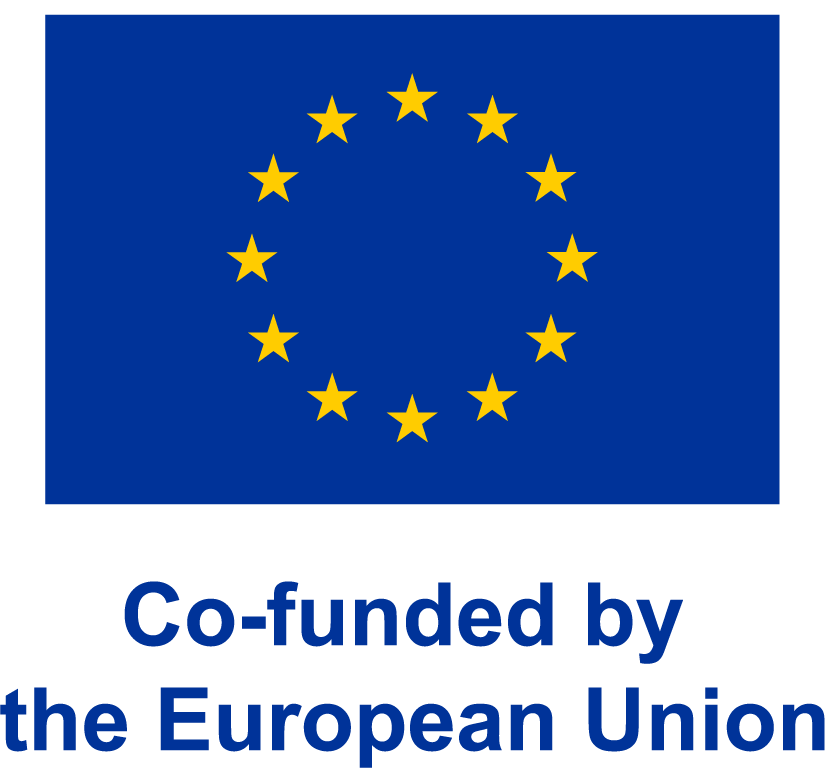 |
 |
